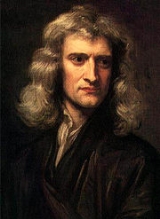Scholars are unsure what Newton may have believed. Historian Stephen D. Snobelen says that he was an antitrinitarian.
replied to: jharrington
Replied to: Scholars are unsure what Newton may have believed. Historian Stephen...
Newton refused last rites on his death bed.
replied to: leslieh
Replied to: Newton refused last rites on his death bed.
In his own day he was accused of Rosicrucianism.
replied to: bravotren
Replied to: In his own day he was accused of Rosicrucianism.
Newton beleived in absolute time and space and therefore it would follow that God would be relational. He never wrote extensively on his theology but it is obvious that because there exists frames of reference throughout the universe and throughout time God therefore would be able to relate to us in these frames of refrence. I don't mean to say that God is limited by inertial frames of reference thereby being unable to relate to us as Einstien suggested with his special theory of relativity. This theory only goes to show the weakness or finiteness of physical time and space. God is not limited by anyones theory he is omniscience and therefore transends the physical universe. But for cogent theological modeling it is apparent that it only maximises Gods ability to relate if one is allowed to point to the relational workings of a tensed universe.. Anyway, it has become assumed by many physists and theologians that because of the special theory of relativity and its added demension of time that there are no preferred frames of reference seeing that time and space do indeed dialate under gravitational fields and the speeds approaching light travel. I myself understand that this is true but I do not believe that Einstien was warranted to dismiss metaphysical realities. His methodology was based on tangible evidence only and so any kind of metaphysical approach was dismissed as he sought to interpert the workings of the universe only from the standpoint of an imperical verificationist. Again, he only ended up showing the limitations of the physical universe. Newton was not only a scientist but also a theologian and for him the use of metaphysical realities were necessarily intrinsic to the workings of a universe that was necessarially created by god. When Einstien reduced the universe to a tenseless state of affairs he exposed the finiteness of our space /time continuum an introduced a static model. He was quoted as saying , "God dosen't play dice with the universe". However, the great Danish scientist Neils Bhor came along and proved experimentally on an atomic level, that particles behave in indeterministic radom events. So the tables were turned around exposing a tensed state of indeterminate affairs which consequently renewed the Newtonian worldview of absolute time and space.
Later, Mike

